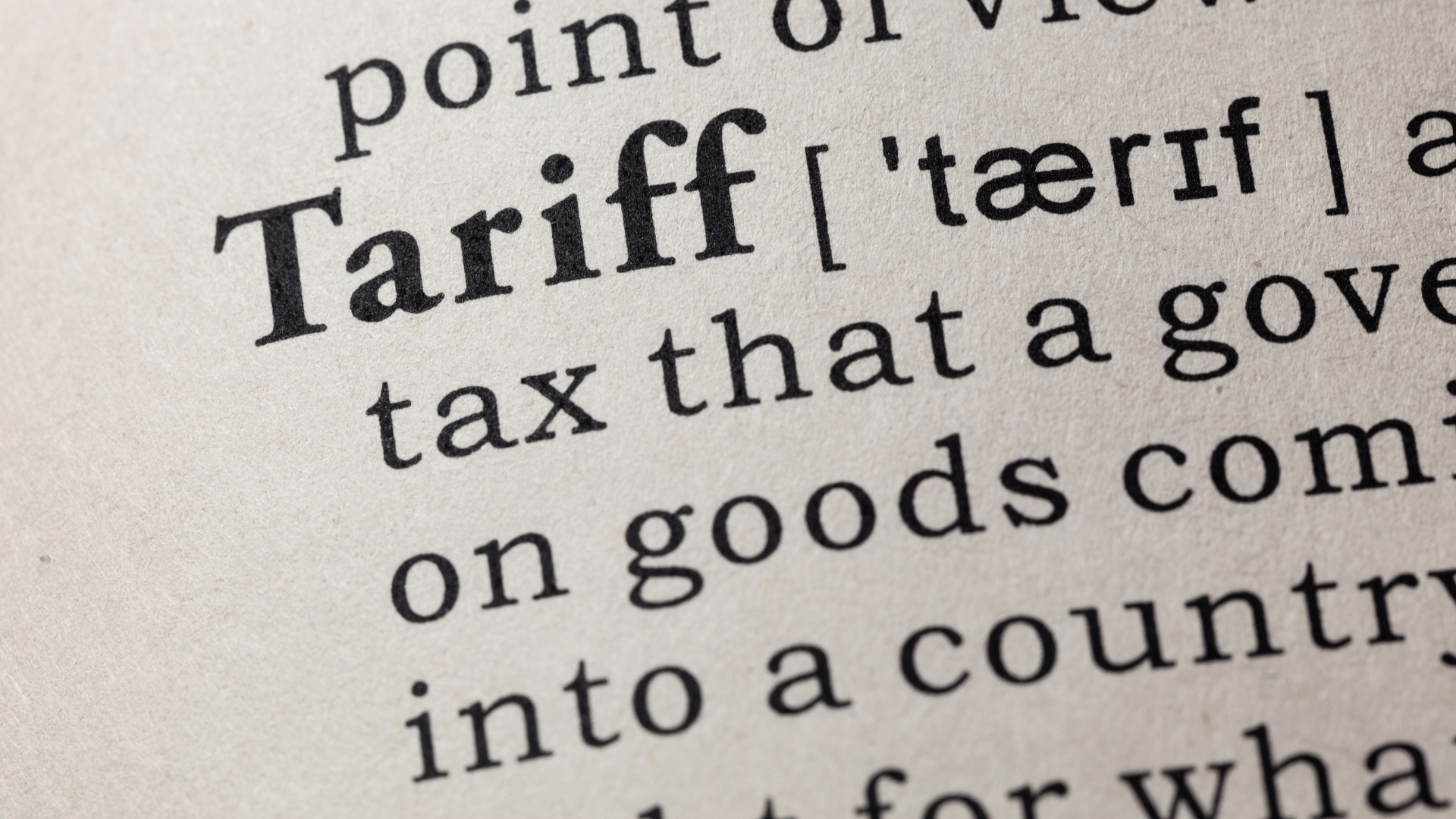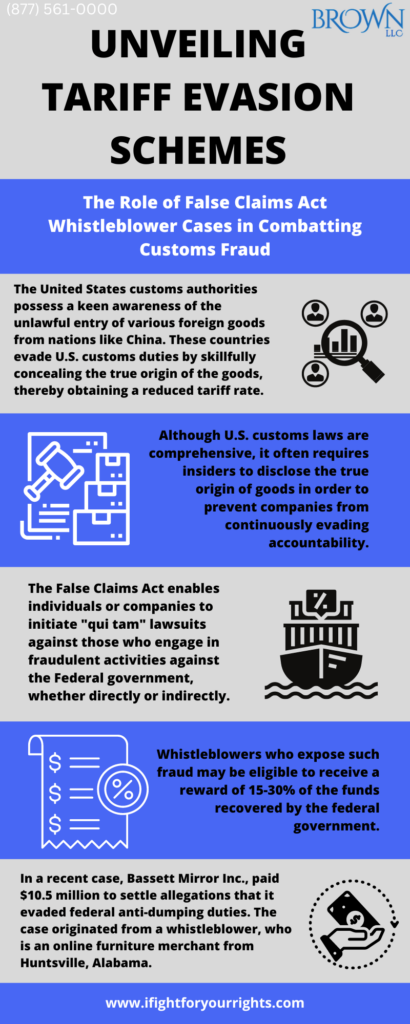The Role of False Claims Act Whistleblower Cases in Combatting Customs Fraud

Customs authorities in the United States are acutely aware of the illicit influx of numerous foreign goods from countries like China, skillfully avoiding U.S. customs duties on items such as steel, honey, furniture, clothing, shrimp, catfish, and much more by concealing the true origin of the goods to obtain a lower tariff rate. This nefarious practice involves “drop-shipping” or “transshipping” these products from China through other countries, and just doing a cosmetic or superficial relabeling to conceal their true country of origin, and then shipping them into the United States, which triggers less of a tariff. Some of the nations involved in this scheme include Mexico, Malaysia, Vietnam, the Philippines, Sri Lanka, and India, among others. The introduction of these products into the American market without paying the appropriate U.S. tariffs not only harms domestic businesses but also undermines the broader U.S. economy by evading the duty.
While U.S. customs laws are robust, it takes insiders to spill the beans on the false origin of the goods, or else companies can perennially evade accountability. One highly successful approach is to utilize the False Claims Act (FCA) to combat this illegal practice, a statute that incentivizes insiders who know of customs fraud and/or tariff evasion to receive up to 30% of what the government recovers for invoking it properly. The federal government increasingly relies on whistleblowers to expose these tariff evasion schemes. U.S. Customs and Border Protection (CBP) is aware conceptually of these illicit activities but often lacks the detailed information needed to act. Furthermore, the federal False Claims Act empowers the government to seek damages up to three times the amount evaded in customs tariffs, making it a potent deterrent. Defendants in these cases are not limited to foreign companies; importers complicit in tariff evasion can also face legal consequences.
Qui Tam False Claims Act
The False Claims Act found in 31 U.S.C. Sec. 3729, allows individuals or companies to file “quitam” lawsuits against those who defraud the Federal government, either directly or indirectly. Whistleblowers who reveal such wrongdoing can receive up to 30% of the funds recovered by the federal government. These lawsuits are filed confidentially and under seal, typically with a statute of limitations of six years but potentially extending to ten years under specific circumstances[JB1], but do not rely on this or any other thing you find online to determine the statute of limitations, for a federal False Claims Act Customs Fraud statute of limitations determination, you must obtain an opinion from a whistleblower law firm
False Claims Act Violation Example
Chinese Aluminum: A Case Study
Six Southern California companies were ordered to pay $1.83 billion in restitution for their involvement in a conspiracy to defraud the United States. These companies, related to each other, exported aluminum disguised as “pallets” to evade $1.8 billion in customs duties. In addition to the civil penalties, a five-year probation sentence was imposed. The defendants were convicted of conspiracy, wire fraud, and other charges, and their actions contributed to inflating a China-based company’s revenues while deceiving global investors. The scheme involved defendants lying to U.S. Customs and Border Protection to avoid paying the United States $1.8 billion in anti-dumping and countervailing duties (AD/CVD) that were imposed in 2011 on certain types of extruded aluminum imported into the United States from China.
Why the False Claims Act?
As you can see, evading customs has both a criminal and civil component like the False Claims Act. When information surfaces regarding the illicit entry of products into the U.S. and schemes designed to evade customs duties and you have inside knowledge of the scheme you’re either part of the solution or part of the problem. the
When a customs fraud False Claims Act whistleblower case is filed by an insider in a position to know with a whistleblower law firm who knows how to litigate False Claims Act cases the United States Attorney’s office and the Department of Justice will take the matter very seriously. The U.S. government is committed to preventing fraudulent evasion of customs duties and is highly interested in rectifying and deterring such violations. The surge in Asian products falsely labeled with their countries of origin entering the U.S. is a clear testament to the necessity of this approach.
Speak with the Lawyers at Brown, LLC Today!
Over 100 million in judgments and settlements trials in state and federal courts. We fight for maximum damage and results.
Notable Cases
In a recent case, Bassett Mirror Inc., a Virginia-based importer of Chinese furniture, paid $10.5 million to settle allegations that it evaded federal anti-dumping duties. The case originated from a whistleblower, who is an online furniture merchant from Huntsville, Alabama. The case was filed as a whistleblower case in 2013 under The False Claims Act after discovering that they could not compete with larger retailers who illegally avoided the 216 percent duty imposed on Chinese wooden bedroom furniture. The year before there was a $15 million settlement for the same scheme. Whistleblower Suit Over Chinese Imports Settles for $15 Million | Daily Report (law.com)
Adulterated Chinese honey has also been a subject of scrutiny. In 2013, individuals and U.S. honey-processing companies were charged with federal crimes related to the illegal importation of Chinese honey through third-party countries to circumvent customs duties. Two of the companies, Honey Holding d/b/a Honey Solutions, and Groeb Farms Inc. entered into deferred prosecution agreements and paid a total of $3 million in fines. Numerous other cases have unveiled unscrupulous honey importers, which included the mixing of honey with high fructose corn syrup by some Chinese companies. Some of the honey illegally entering the U.S. was even adulterated with the antibiotic chloramphenicol, a chemical that is not approved by the FDA.
Americans consume over 1.4 pounds of honey annually, and more than 70 percent of it is imported. In 2001, the Commerce Department imposed substantial tariffs on Chinese honey due to dumping practices that lowered market prices. In response, Chinese honey makers began shipping their products to countries such as Shanghai, Thailand, and South Korea, where major customs tariffs were absent and then redirected these products to the U.S. When chemists detected the presence of unapproved antibiotics used in China, the honey barrels were rejected. Yet, illegal honey adulteration persists to this day.
There’s a reason why there are tariffs imposed on certain goods entering the United States, and why there are different rates for different countries. It’s an old trick to conceal the true country of origin to lower the tariff, but it’s an illegal one. Individuals who are aware of customs fraud violations stand to receive millions in tariff whistleblowing awards if they disclose the information in a timely way using the federal False Claims Act through a false claims act attorney.

